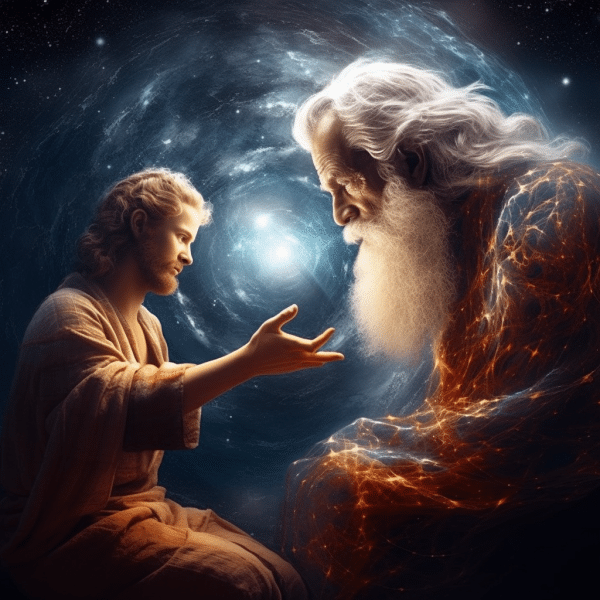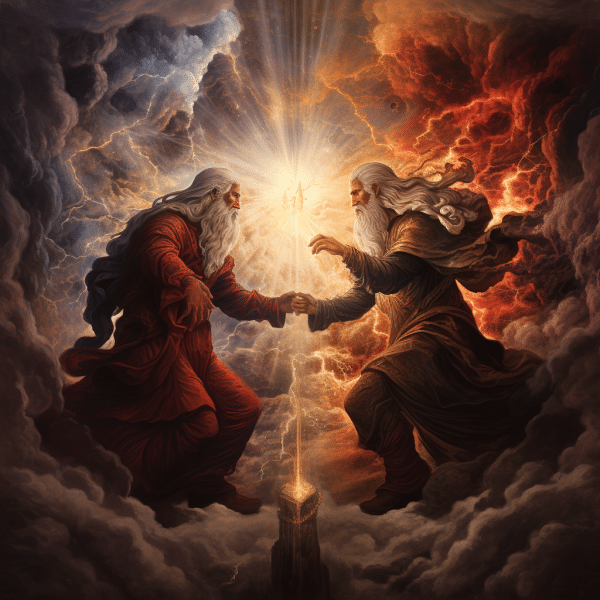

The mysterious ties between God and humans have inspired minds for centuries. This intricate web of intertwined threads is a complex tapestry that leaves seekers of truth in awe. Let us journey into this vast connection, guided by curiosity and open hearts.
The relationship between God and humans can be likened to a symphony, where each note works in harmony to create a melody of purpose and meaning. We are part of a cosmic embrace that we may not comprehend. As we explore this realm, we learn our place in this divine symphony.
Theories of this bond vary. Some say humans are puppets of a powerful deity, while others suggest a collaborative effort between humanity and God. Either way, one truth remains: there is an unbreakable connection.
Ancient stories offer insight into this relationship. Greek myth tells of Prometheus giving fire to humans against Zeus’ wishes. This symbolizes the balance between divine grace and human choice, showing us that our actions bear weight in both spiritual and mortal realms.
As we ponder the union between God and humans, we find ourselves with more questions than answers. What is our role in this cosmic dance? How do we build a deeper bond? These queries encourage us to find our own truth.
This relationship between God and humans is an enigma. We can use this opportunity to explore our beliefs, challenge the status quo, and ignite our divine curiosity. Through the pursuit of knowledge, we will uncover our bond to the divine.
Understanding the Concept of God and Humans
Exploring the relationship between humans and God is a complex concept that has puzzled theologians for centuries. It dives into spirituality, faith, and the purpose of existence. Basically, it investigates the link between divine and mortal beings.
Throughout time, diverse religious teachings have displayed different views on the subject. Some characterize God as a distant ruler from heaven, while others see Him as a near presence in each person. These views originate from specific cultural, philosophical, and theological standpoints.
Despite the varied interpretations, many believe that humans are made in the image of God. This idea implies that humans possess a unique essence that reflects the qualities of the divine. It signifies an intimate bond between people and their creator.
Moreover, spiritual practices such as prayer, meditation, or acts of service are encouraged to create a deeper understanding of God and to form a strong relationship with the divine. Additionally, believers may experience divine guidance or providence, which they interpret as messages from God. These moments are seen as chances for growth and transformation.
In conclusion, having an open mind and humility can help us appreciate different perspectives and deepen our understanding of this relationship.
The Role of Religion in Defining the Relationship
Religion is key to defining the relationship between God and humans. It acts as a guide that shapes our perception of the divine and our purpose in the world. Through religious practices, rituals, and beliefs, we try to build a connection with the divine and comprehend our moral and ethical duties.
Religious teachings provide us with an insight into the relationship between God and us. They contain sacred texts or scriptures that are viewed by believers as sources of divine knowledge. By analyzing and pondering over these texts, we can comprehend our role in life and our responsibilities towards God.
Religion also gives us a sense of community. People assemble at places of worship to rejoice, seek comfort in hard times, and share their faith experiences. This creates a setting where people can bond with others who share similar values and beliefs. This feeling of togetherness builds a stronger relationship not only with other humans, but also with God.
God and humans
Moreover, religious rituals help shape our relationship with the divine. Whether it’s prayer, meditation, or acts of devotion, these rituals are structured ways to interact with the spiritual realm and express our loyalty to God. Through these acts of worship, individuals show appreciation, ask for guidance, or seek forgiveness. Such rituals serve as powerful reminders of our bond with the divine.
To further strengthen the relationship between God and humans, individuals should reflect and introspect. By regularly evaluating one’s actions and intentions, we can evaluate if they are in line with our religious principles and strive for personal growth. This introspective practice helps us recognize areas for improvement and make changes to deepen our connection with God.
In addition, showing kindness and compassion to others is another way to increase our connection with the divine. Many religions emphasize the importance of treating others with love, respect, and care. By displaying these qualities to fellow humans and all of God’s creations, we fulfill our moral duties and demonstrate our dedication to a harmonious relationship with the divine.
Challenges and Controversies in the God-Human Relationship
Questions about the God-human relationship have been discussed for centuries. It is a complex topic, involving divinity and humanity, and their interactions. Let’s look at it in detail.
The Challenges:
- Theodicy: How can an all-powerful and benevolent deity allow suffering and evil?
- Problem of Evil: Why does evil exist?
- Divine Intervention: Does God intervene in human affairs?
- Role of Faith: What is the role of faith in the relationship?
- Existence of Miracles: Can miracles really happen?
The Controversies:
- Predestination vs. Free Will
- Interpretation of Religious Texts
- Atheism vs. Theism
- Moral Dilemmas
- Science vs. Religion
Discussing this relationship requires respect for different beliefs. Engaging in open conversations can help bridge gaps between different perspectives.
Remember, when talking about this topic, actively listen to others, and keep an empathetic and respectful dialogue.
Personal Interpretations and Experiences
Individuals’ interpretations and experiences of the relationship between God and humans can be vastly different and are usually affected by personal beliefs, cultural background, and religious teachings.
Here are three points to contemplate:
Personal Connection:
- Many individuals view this relationship as a personal connection with God, believing in direct communication via prayer or meditation. They feel comfort, direction, and assistance from a divine being.
Divine Plan:
- Some people view the relationship as part of a divine plan. They think God has a special path for every human and that everything happens for a reason. These people may find comfort in giving up control to God’s will.
Moral Guidance:
- For some, the relationship between God and humans is defined by moral guidance. They see God’s teachings as a moral compass for decision-making, searching for guidance in religious texts and adhering to principles that promote kindness, mercy, honesty, and justice.
Also, it’s important to note that individual interpretations and experiences can be influenced by special details like personal encounters with miraculous events or profound spiritual experiences. These special events may strengthen someone’s faith in God and deepen their understanding of this spiritual bond.
Considering these different interpretations and experiences, it is essential to maintain an open mind when discussing the relationship between God and humans. Respectful dialogue can help create mutual understanding and respect for various perspectives. Here are some tips on how to talk about this topic:
- Active listening: Listen to others without cutting in or disregarding their beliefs. Try to comprehend their experiences and the reasons behind their interpretations prior to sharing your own views.
- Empathy: Exhibit empathy towards diverse viewpoints even if they differ from your own. Acknowledge that people’s spiritual journeys are unique, shaped by their own life experiences.
- Respectful questioning: If seeking clarification or expressing disagreement, do so respectfully without belittling or disparaging the other person’s beliefs. Aim to understand their perspective rather than trying to persuade them of your own.
By following these tips, individuals can have meaningful and respectful discussions about the relationship between God and humans, which can create an atmosphere of understanding and compassion.
The Evolution of the Relationship Over Time
Throughout history, God and humans have experienced big shifts in their relationship. This has changed how people view and act with their higher power.
From ancient times, polytheistic beliefs were common. But in the Middle Ages, the Church’s influence was strong. The Enlightenment brought a new way of thinking, challenging religious customs. Now, we see many religions and more people without religion.
To have a good relationship with God, people must have tolerance and respect for all beliefs. Talking openly can help people understand each other. Empathy towards others helps create a caring environment.
Having individual agency helps people find their own way to connect with God. Acknowledging that faith is personal lets people find their own spiritual journey.
As society changes, so does the relationship between God and humans. Diversity and individual spirituality will help keep this relationship meaningful for future generations.
Conclusion: A Complex and Ever-Evolving Connection
Humans have always wanted to know their connection to God. It is intricate and ever-changing. Different beliefs shape how divine and mortal beings interact. It is clear that the link between God and people is complex and ongoing.
Throughout history, folks have tried to understand the nature of this bond. Religious traditions provide unique ideas about humans’ role. Some think humans are tools of God’s will, while others see them as co-creators. This range of beliefs shows how hard it is to understand our position in the universe.
Additionally, our experiences shape our view of this relationship. Personal meetings with the divine frequently cause big changes. They can be moments of clarity during prayer or meditation, or sudden moments of enlightenment.
Therefore, there are tips to build a deeper connection between God and humans:
- Develop a regular spiritual practice. This can create an area for self-reflection and connecting to the divine within. Prayer, meditation or rituals that come from a faith tradition can help nurture this sacred bond.
- Do acts of kindness, such as forgiveness, empathy and love. This honors the goodness that is in all of us.
Lastly, learn about different religious perspectives. This can expand our understanding of the divine, and deepen our connection.
Frequently Asked Questions
Q: What is the relationship between God and humans?
A: The relationship between God and humans is often described as one of love, guidance, and communication. God is seen as the creator of all things and humans are considered to be God’s creations.
Q: Does God care about humans?
A: Yes, God is believed to care deeply about humans. Many religious teachings emphasize that God is loving and compassionate towards his creations, including humans. God is said to listen to prayers, offer guidance, and provide help when needed.
Q: Can humans have a personal relationship with God?
A: Yes, many individuals believe in having a personal relationship with God. This can involve prayer, meditation, and seeking spiritual connections. Some people feel a deep sense of connection and guidance from God in their everyday lives.
Q: How can humans connect with God?
A: These can include prayer, meditation, attending religious services, studying religious texts, and living a moral life aligned with one’s faith.
Q: Can humans understand God’s purpose and plan?
A: Understanding God’s purpose and plan is a complex and often debated topic.








